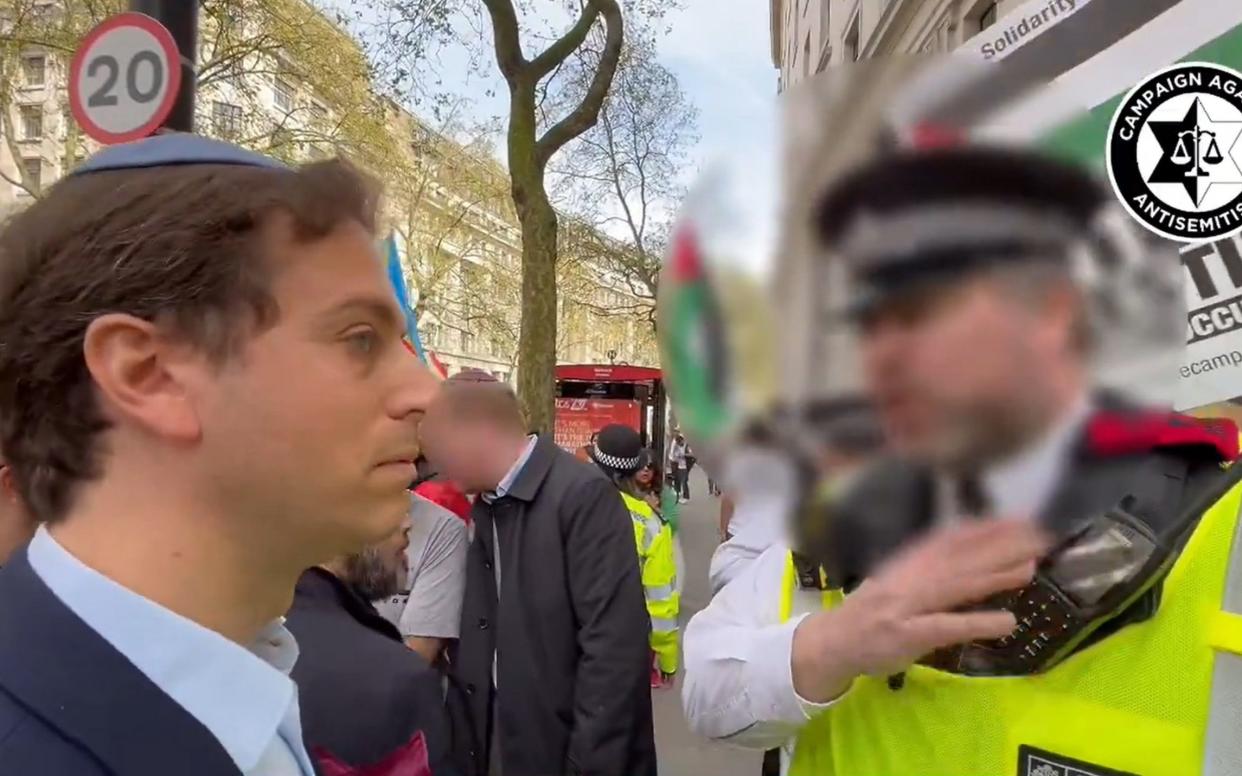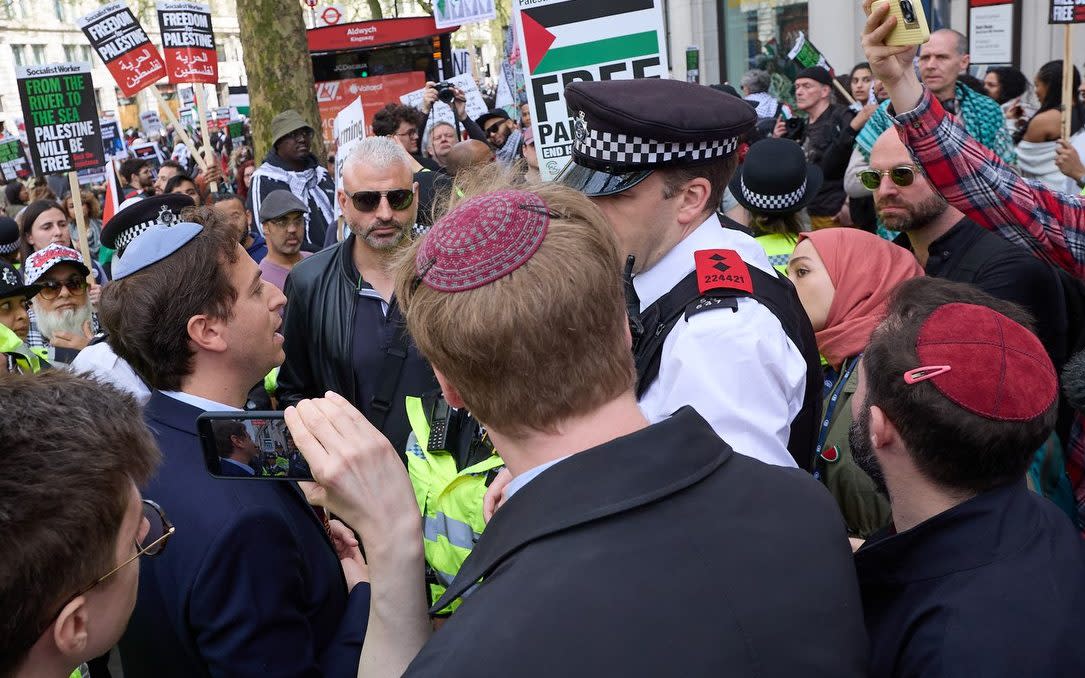Police under fire after threat to arrest ‘openly Jewish’ man near pro-Palestinian protest
Metropolitan Police officers threatened to arrest an “openly Jewish” man for walking in central London during a pro-Palestinian protest.
The force suggested Gideon Falter’s presence was “provocative” and that he was “antagonising” protesters.
Mr Falter, the chief executive of the Campaign Against Anti-Semitism, had just left a synagogue and was wearing a kippah skullcap.
He was told by a Scotland Yard sergeant in the Aldwych area of central London that his presence could inflame tensions, and was later warned by a different officer that he would be arrested if he did not leave the location.
Responding to the incident on Friday, Assistant Commissioner Matt Twist, one of the Met’s most senior officers, said being present when marches were taking place could be “provocative”, in comments that were described as “victim blaming”.
The force has since apologised for the remark.
Earlier on Friday, the Government warned police that they must not prevent British Jews from continuing their daily lives.
A source said: “These reports are concerning and unacceptable. British Jews should be free to walk about their lives freely without intimidation or restriction, and the police have a vital role in making sure that is a reality.
“As we have shown with the largest-ever funding package for security, we won’t hesitate to take action to support and protect our Jewish communities.”
James Cleverly, the Home Secretary, has written to the Met and Sadiq Khan, the London Mayor, about the incident.
The Met has faced repeated criticism over pro-Palestinian marches, which have become regular weekend occurrences in central London and have been criticised for displays of anti-Semitism.
Robin Simcox, the UK’s counter-extremism tsar, warned last month that the marches were turning the capital into a “no-go zone for Jews every weekend”.
On March 1, Rishi Sunak gave a speech outside Downing Street o in which he warned of a rise in extremism since the Hamas attacks on Israel and the war in Gaza.
He issued a plea for pro-Palestinian protesters to reject radicals hijacking the marches and urged police to take a tougher stance.
Suella Braverman, the former home secretary, and Robert Jenrick, the former communities secretary, criticised Scotland Yard on Friday.
Mrs Braverman said that, while public order officers had a difficult job, there was increasing evidence of “mistakes and double standards” from the Met.
She added: “It’s not right that one group of people cannot exercise their rights to enjoy London peacefully in order to allow another group to express their hatred and intimidation freely. That’s striking the wrong balance.
“We’ve seen six months of mistakes, apologies and double standards from the police. Trust is lost as it appears that they’ve picked a side. If the police are failing to enforce the law out of fear of the reaction of the mob, they are no longer policing without fear or favour.
“Nothing has changed because no one has been held to account. Words are meaningless. Ministers and the Mayor must act. This cannot go on.”

Mr Jenrick said Sir Mark Rowley, the Met Commissioner, should be held to account if the law was not applied equally.
He said: “If the police believe that the sight of a Jewish man on the streets of central London might provoke a violent response from protestors, then the answer is quite simply to ban the protest. This would, of course, have been the outcome if the far-Right were protesting on the streets of London intimidating any other minority group.
“But instead, the Met police continue to fail to enforce the law equally to Islamists and anti-Semites.”
The exchange occurred last Saturday as Mr Falter was trying to cross the road in Aldwych while a march was going past.
The officer told him: “You are quite openly Jewish. This is a pro-Palestinian march. I am not accusing you of anything, but I am worried about the reaction to your presence.”
A short time later, a different officer warned him that he would be arrested if he did not leave the area. The officer said: “If you chose to remain here, because you are causing a breach of the peace with all of these other people, you will be arrested... because your presence here is antagonising a large group of people.”
Mr Falter, who was with friends after attending synagogue, accused the Met of preventing him from walking around his home city as a Jewish Londoner.
But Assistant Commissioner Twist said on Friday that being present when marches were taking place could be “provocative”.
While admitting the footage would further dent the confidence of Jewish Londoners and saying the force regretted the use of the term “openly Jewish”, he said filming such exchanges made the police’s job even more difficult.
In a statement, he said: “The use of the term ‘openly Jewish’ by one of our officers is hugely regrettable. It’s absolutely not the basis on which we make decisions. It was a poor choice of words and, while not intended, we know it will have caused offence to many. We apologise.”

But he added: “In recent weeks we’ve seen a new trend emerge, with those opposed to the main protests appearing along the route to express their views.
“The fact that those who do this often film themselves while doing so suggests they must know that their presence is provocative, that they’re inviting a response and that they’re increasing the likelihood of an altercation.
“They are also making it much more likely that officers will intervene. They don’t do so to stifle free speech or to limit the right to protest, but to keep opposing groups apart, to prevent disorder and keep the public, including all those... opposing the protest, safe. That is, after all, our primary role.”
Responding to the comments, Mr Falter said: “This is absolutely appalling victim-blaming by the assistant commissioner. What has dented Jewish Londoners’ confidence in the Met is not us making this video public, but the actions of the Met’s officers telling me that I cannot be in the area whilst ‘openly Jewish’.
“The assistant commissioner appears to be saying that we should have taken this on the chin and kept the video under wraps. Not only that, but whilst apologising for the behaviour of his officers he then doubles down on their language by saying that the presence of people like me – Jews – is ‘provocative’.
“It is my right, and the right of every Jew, to walk freely around London. If police threaten us with arrest for doing so or consider our presence to be a provocation, then the Met has decided wholesale to curtail the rights of Jews in order to appease lawless mobs.”
In a statement on Friday, the Met Police said: “We have reflected on the strength of the response to our previous statement. In an effort to make a point about the policing of protest, we caused further offence. This was never our intention. We have removed that statement and we apologise.
“Being Jewish is not a provocation. Jewish Londoners must be able to feel safe in this city. Our commitment to protecting the public extends to all communities across London. It’s important that our public statements reflect that more clearly than they did today.”
Mr Falter told The Telegraph that despite the Met claiming it was powerless to ban the marches, the law allowed restrictions where they caused “significant disruption to the life of the community”.
He said: “If not being allowed to be Jewish in public is not ‘serious disruption to the life of the community’ then I do not know what is. This is the inevitable conclusion of Sir Mark Rowley’s policy of appeasement – it is no longer safe to be openly Jewish on the streets of London when one of these so-called peace marches is taking place.”


